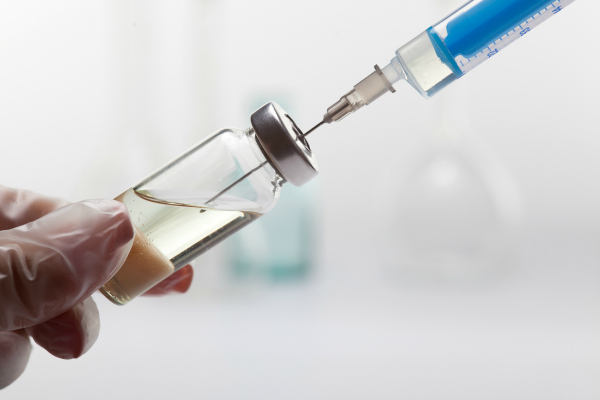
Labels on all testosterone products must now include information about the risk of abuse, according to a ruling issued by the U.S. Food and Drug Administration (FDA) last week.
The agency explained that the labeling change stems from published literature and case reports on the abuse of testosterone and other anabolic androgenic steroids.
Produced by the testes, testosterone is an important hormone for men. It creates and maintains many of their masculine characteristics, including facial hair, muscle mass, and a deep voice. It is also involved with sex drive and erections.
Doctors may prescribe testosterone when men’s bodies don’t produce enough of it on their own. For example, certain genetic conditions, chemotherapy, infection, and injury to the testes can all affect a man’s testosterone production. Currently, the FDA approves the use of testosterone for men in these situations.
However, testosterone levels naturally decline as men get older. As a result, men may feel weak, fatigued, and irritable. They may also lose interest in sex and have problems getting erections. Sometimes, doctors prescribe testosterone to treat these symptoms.
Some men abuse testosterone, taking more than the recommended dose and/or taking it with other anabolic androgenic steroids. Some athletes and bodybuilders take testosterone or other drugs to enhance their performance.
The FDA reports that testosterone abuse can damage the heart, brain, liver, and the endocrine system. It may also affect a man’s mental health.
“Reported serious adverse outcomes include heart attack, heart failure, stroke, depression, hostility, aggression, liver toxicity, and male infertility,” the FDA said in a press statement, adding that men undergoing withdrawal from testosterone may have symptoms such as “depression, fatigue, irritability, loss of appetite, decreased libido, and insomnia.”
The FDA also advised healthcare providers to measure a man’s testosterone if they suspect he is abusing the hormone.
Resources
LiveScience.com
Rettner, Rachel
“Prescription Testosterone Gets New Warning”
(October 25, 2016)
http://www.livescience.com/56640-prescription-testosterone-warning.html
MD Magazine
Black, Ryan
“FDA Announces Stern New Warning Labels for Testosterone Treatments”
(October 25, 2016)
Medscape
Brooks, Megan
“FDA Adds New Warnings to All Testosterone Product Labels”
(October 25, 2016)
http://www.medscape.com/viewarticle/870932
Reuters
Clarke, Toni
“U.S. FDA adds abuse warning to prescription testosterone”
(October 25, 2016)
http://www.reuters.com/article/health-testosterone-fda-idUSL1N1CV1MA
U.S. Food and Drug Administration
“FDA approves new changes to testosterone labeling regarding the risks associated with abuse and dependence of testosterone and other anabolic androgenic steroids (AAS)”
(Press statement. October 25, 2016)
You may also be interested in...
Other Popular Articles

What Is the Average Penis Size?
If you have ever wondered how your penis compares to others in terms of size, you are not alone. Many men are curious to know how their penises stack up compared to the average. Unfortunately, general curiosity can sometimes give way to full-on obsession and anxiety about penis size. This can be an unhealthy and often unnecessary fixation, especially because most men who think their penises are too small have perfectly normal-sized penises.

What Is Jelqing, and Does It Actually Work?
The term “jelqing” refers to a set of penis stretching exercises that some believe can make the penis bigger. Although the practice has gained attention and popularity in blogs and internet forums in recent years, there is no scientific evidence that it is an effective way to permanently increase the size of one’s penis. In fact, in some cases, jelqing may actually cause damage to the penis, so it is a good idea to get all the facts before setting off to try it.

What Is Sensate Focus and How Does It Work?
Sensate focus is a technique used to improve intimacy and communication between partners around sex, reduce sexual performance anxiety, and shift away from ingrained, goal-oriented sexual patterns that may not be serving a couple.

Can Sex Reduce Menstrual Cramps?
The SMSNA periodically receives and publishes ‘guest editorials.’ The current article was submitted by Mia Barnes, a freelance writer and researcher who specializes in women's health, wellness, and healthy living. She is the Founder and Editor-in-Chief of Body+Mind Magazine.
Having sex while you experience menstrual cramps is healthy and can provide significant benefits. While it might not be the first activity that comes to mind when your PMS or period cramping begins, many people enjoy sex to reduce menstrual cramps, experience increased pleasure and benefit from other advantages. Learn more about having sex while menstrual cramps are happening and how it can help your body.

How Long Does It Take the Average Man to Ejaculate?
On average, it takes a man between 5 to 7 minutes to orgasm and ejaculate during sexual intercourse.

Can Sex Throw off Your Vaginal pH Balance?
The SMSNA periodically receives and publishes ‘guest editorials.’ The current article was submitted by Mia Barnes, a freelance writer and researcher who specializes in women's health, wellness, and healthy living. She is the Founder and Editor-in-Chief of Body+Mind Magazine.
Your vagina is a pretty powerful organ. It is a pathway for menstrual blood and babies. It also is a main player in sexual intercourse. You might hear about your vagina’s pH and worry that yours is at risk. Here’s what to know about vaginal pH, including the impacts sex could have.
You are prohibited from using or uploading content you accessed through this website into external applications, bots, software, or websites, including those using artificial intelligence technologies and infrastructure, including deep learning, machine learning and large language models and generative AI.

